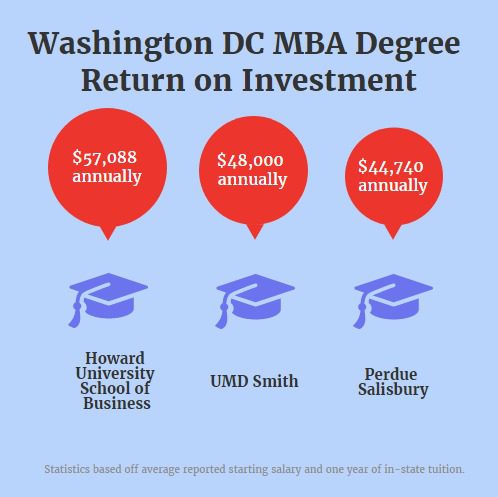Choosing the Best MBA: Philadelphia vs. Washington DC

On the surface, cities like Philadelphia and Washington DC appear to have a lot in common. Both have occupied roles as a center of U.S. history, and have transformed into exciting and ever-changing metros for both established businesses and new startups. If you’re interested in earning an MBA in a top metro area on the East Coast, it might seem impossible to choose between the two.
Even so, Philadelphia and DC offer a number of exciting—but different—kinds of opportunities for up-and-coming business professionals. Between what program you want to pursue and what kind of career you envision yourself in down the line, understanding the differences between top metros can be a crucial part of planning your future. Below, we’ll break down some of the biggest differences in location, programs, and job placement for each metro.
Philadelphia vs. Washington DC: The Differences
For ambitious business students hoping to put their education to work in a government agency, it’ll be hard to beat the nation’s capital for opportunities and experience. Even for those looking outside of the government setting, the DC metro area is home to fifteen companies on the Fortune 500 list, including corporate giants like Exxon Mobile and Walmart. Yet while such heavy hitting companies in the area provide a high earning potential, MBAs will still want to consider the high price of living in DC: currently, the city ranks as the third most expensive place to live in the country.
Check This Out: Searching for the World’s Top MBA Recruiters: Comcast
While Philadelphia may not be the city that pops into your mind as a bustling center of business, research shows the City of Brotherly Love can’t be beat when considering the job market and affordability: a 2016 survey from Adobo found that Philadelphia’s unemployment rate was 20 basis points below the national average, while the average price of a home was at or below 30 percent of the average income. MBA graduates will find no shortage of business opportunities in the city, even among major firms: in 2017, 20 companies in the Philadelphia metro made the Fortune 500 list.
Washington DC’s Full-Time MBA Programs
Featuring more than 35 higher education institutions with post-bachelor business programs, Washington DC is home to some of the top MBA programs in the United States. Fully aware that many of these programs will shape future politicians and government leaders, many of the MBA programs in Washington DC include a focus on integrity and ethics within the global business community.
Full-Time MBA Programs in DC Include:
- George Mason University School of Business
- George Washington University School of Business
- Kogod School of Business – American University
- University of Maryland R.H. Smith School of Business
- McDonough School of Business – Georgetown University
Philadelphia’s Full-Time MBA Programs
When it comes to business schools, Philadelphia is probably best known for The Wharton School at the University of Pennsylvania, consistently named as one of the top business programs in the world. But Philly is also home to a wide range of programs with a variety of specializations. Programs like the full-time MBA at Temple University’s Fox School of Business also offer students to take their education beyond Philadelphia, with international campuses based in Italy, London, and Japan.
Full-Time MBA Programs in Philadelphia Include:
- La Salle University
- LeBow College of Business – Drexel University
- Villanova School of Business
- West Chester University
Cost of MBA Programs
Just as important a factor as cost of living, average cost for an MBA program is an important consideration when choosing where to earn your degree. As expected, top programs in both Philadelphia and Washington DC can come with a high price tag. The average cost estimate for one year at Wharton is $105,265, while tuition at DC’s Georgetown McDonough School of Business is $90,591. The average for each city, however, remains much for affordable: approximately $82,090 for programs in Washington DC, and slightly lower in Philadelphia—schools like West Chester even offer an MBA as low as $21,000 per year.
Job Placement and Salary
With so many incredible companies located in both Washington DC and Philadelphia, MBAs have the chance to earn top salaries that can go a long way in both cities. Depending on the position, MBAs in Philadelphia can make anywhere from $64,665 per year (as a financial analyst) to $104,186 per year (as a senior product manager). In Washington DC, the average salary for an MBA graduate is in the $80,000 range, with employees reporting yearly salaries of $74,758 (operations manager) up to $111,983 (marketing director).
The Secret To Finding An Affordable Washington DC MBA

Washington DC may be a top city for students pursuing their MBAs, but the city’s high cost of living could prove prohibitive for many young Mstudents. Growing rent prices over the past ten years have led DC to be one of the least affordable of the major U.S. metropolitan areas.
Of course, MBA students looking to apply their education to governmental agencies won’t find a better place to do so than in the nation’s capital. And though contending with high rent prices may be unavoidable, many business schools offer students a number of ways to keep the cost of their degree at a minimum.
From scholarships to grants and student work opportunities, business schools in Washington DC ensure that low-income applicants can have equal access to the high quality education their program’s provide. Below are just a few of the opportunities provided to assist low-income applicants at Washington DC MBA programs.
Finding An Affordable Washington DC MBA
McDonough School of Business – Georgetown University
Over $1.5 million in aid is available to MBA applicants through merit based scholarships at Georgetown University’s McDonough School of Business. All students are eligible for these grants, but it is advised to apply for the program early to best position yourself for consideration. International students in need of additional funding may also apply for external scholarships and private loans specifically for international students. The university has compiled a list of common lenders that students may want to consider here.
McDonough also provides scholarship opportunities through the Consortium, a group whose goal it is to reduce the under-representation of blacks, Native Americans, and Hispanic students in business education. As a member school, a number of scholarships are also available at McDonough for students admitted as part of the Consortium.
University of Maryland R.H. Smith School of Business
Roughly 85 percent of MBA students at UMD Smith receive merit based awards to help fund their education. Between scholarships, fellowships need-based awards and assistantship opportunities, students have a number of opportunities to reduce their tuition and keep their MBA affordable. Awards such as the Dean’s Award of Smith award provide two years and one-year of full scholarship and fees. Students may also find additional opportunities for scholarships through the university’s organizational partnerships, such as the Forté Foundation or management Leaders for Tomorrow.
YOU MAY ALSO LIKE: Georgetown McDonough Offers New FinTech Elective
George Mason University School of Business
The George Mason University School of Business provides one of the best values in education, demonstrated through the high success rate of alumni and the fact that Mason alumni have the lowest student loan default rates in Virginia.
Mason offers a number of financial aid opportunities through grants, scholarships, work-study employment, and loans. Every year, the school offers millions of dollars to incoming students, including fellowships for graduate students. The Office of Student Financial Aid is dedicated to assisting each student in finding the financial assistance that is needed for their degree.
George Washington University School of Business
The George Washington University School of Business offers a number of different ways for students to reduce the cost of their MBA degree. Each year, graduate students may apply to a number of different fellowships, available through the university as well as private foundations and agencies. At the Office of Graduate Student Assistantships & Fellowships, students can search through these numerous opportunities and see which scholarships best fit their qualifications.
GWU also offers Financial Aid based on the need of each students. Eligible applicants can apply for need-based aid by filing the Free Application for Federal Student Aid (FAFSA).
Howard University School of Business
MBA students at the Howard University School of Business may be eligible both for federal student aid, based on need, and a variety of scholarships, which are given based on merit and other factors. Scholarships range, and may cover up to full-tuition, while others provide partial funding. Howard MBA students may also pursue loans for tuition through the ACCESS Loan Program, Alternative Education Loans, or other private loan services.
Kogod School of Business – American University
The Kogod School of Business at American University ensures that its high quality education can be affordable for all. Roughly 80 percent of all students receive financial aid of some kind, with almost $85 million awarded just to the undergraduate population. Kogod offers both need-based aid and merit scholarships. Students may contact the Graduate Admission Office at Kogod for more information on the scholarships available to them, but all applicants who demonstrate excellent academic credentials will be considered for these honors—a separate application process is not needed.
Hiring Practices Examined in New UMD Smith Research

Did you know that about half of job openings go to friends and acquaintances of high-powered individuals within an organization? We’ve always been told it’s about who you know, not what you know, after all.
Yes, referral-based hiring come across as a little sketchy, but many human resource departments actually encourage the strategy. But despite that, a research paper co-written by two Robert H. Smith School of Business scholars shows that hiring managers invite harsh moral judgments when they give jobs to friends and acquaintances referred to them.
Entitled “Compromised Ethics in Hiring Processes? How Referrers’ Power Affects Employees’ Reactions to Referral Practices,” the author’s note; “When the referrer is powerful, observers will believe the hiring manager is attempting to increase the referrer’s dependence on him/her, ultimately resulting in future benefits for the hiring manager.”
The research was authored by UMD Smith professor Rellie Derfler-Rozin, Ph.D. candidate Bradford Baker, and Harvard Business School professor Francesca Gino and published in the Academy of Management Journal. They found that hiring managers appear self-serving and unethical to others in the organization, which can disrupt workplace chemistry and even hurt support for the new hire.
“Referral practices can be seen as morally murky territory in which special interests and the exchange of favors dominate, above and beyond merit,” the authors wrote.
However, they also found that referral-based hiring practices have advantages: Not only do referrers usually have inside information about the applicants they recommend, but they also have incentives to train, mentor, and monitor them as well. Additionally, new hires want to perform well so they don’t embarrass the referrers who put trust in them.
Ultimately, the research does not suggest that companies should stop referral-based hiring, but that hiring managers and the people who give referrals should be mindful of the power dynamics involved.
“One suggestion could be creating a system in which referrers are anonymous, at least for an initial period of time pre and post-hire, while simultaneously providing enhanced transparency regarding the reasons for the referral,” the authors write.
You can read the entire research paper “Compromised Ethics in Hiring Processes? How Referrers’ Power Affects Employees’ Reactions to Referral Practices” here.
For a Career in Supply Chain Management, Head to Washington DC

Today’s boardroom is tomorrow’s chopping block. Business is a beast, no doubt, one whose needs grow increasingly demanding and complex along with those of we, the consumers, who drive it.
To navigate let alone thrive in this hectic environment requires unprecedented strategy, analysis, and execution. For many companies navigating the unruly seas, so to speak, the great white hope is an unsung hero of sorts: the supply chain manager.
Supply chain managers, or SCMS, have long been vital to the quality and productivity of projects. In short: SCMs oversee how all the constituent parts of their product—raw materials, information, and finance—move from supplier to manufacturer to wholesaler to retailer to consumer.
There are certainly lots of moving parts to this position—no pun intended—which makes sense why supply chain management has become such a popular concentration at business schools and an increasingly in-demand gig for graduates.
When it comes to ideal places to pursue an SCM degree, it doesn’t get any better than Washington DC, a cosmopolitan, cross-sectional hub for politics, business, and tech. In addition to its strategic mid-Atlantic location, sandwiched between the business centers of the lower Midwest, the upper Southeast, and the lower Northeast, the Chocolate City is home to a wide range of industry players, offering infinite access to whichever field you aspire to enter through an SCM degree. In addition to the warm, friendly folks like Lockheed Martin and Capital One that make their home in the Beltway, startups like HireKeep, NotionTheory, and Click2Mail do as well.
For you aspiring supply chain managers out there, we did the legwork for you and took a deeper dive into four DC metro degrees.
University of Maryland’s R.H. Smith School of Business
The UMD Smith MS in Supply Chain Management is consistently ranked as one of the most innovative in the region. Whether you’re looking to become a buyer, a logistics officer, freight specialist, or key account specialist, Smith will give you the “relevant, real-world experience” needed to “drive business growth, promote efficiency, sustain the planet,” and last but not least—impress recruiters. Smith’s deep ties to Wal-Mart, Bosch Rexroth, AstraZeneca, China Mobile Cooperation, and Unilever will surely benefit Smith MBAs. All graduates become Lean Six Sigma Yellow Belt™ (ICYB™) Certified by the International Association for Six Sigma Certification (IASCC).
Howard University School of Business
The Howard University School of Business‘ Supply Chain Management (SCM) concentration was designed specifically to prepare students for “leadership roles in global corporations and government entities.” Howard’s combination of faculty, curriculum, executive sponsorship, and real world experience means that graduates are well-equipped to meet the demands of an increasingly competitive job market.
CHECK THIS OUT: What Are The Differences Between The World’s Best Online MBA Programs?
Georgetown’s McDonough School of Business
Operations and Information Management (OPIM) concentration at Georgetown University’s McDonough School of Business is an interdisciplinary effort that combines Production and Operations Management, Operations Research/Management Science, Statistics/Decision Analysis, and IT/Systems Management. OPIM was designed to create opportunities for research and employment within information systems that support decision processes, risk management, business analytics, and global operations.
George Mason University School of Business
The George Mason University School of Business offers a Project Management concentration that might appeal to MBA candidates with an interest in supply chain. The Project Management concentration—available both online and on-campus—was designed to give MBA candidates the “knowledge and skills needed to manage major projects from conception to implementation.”
What are the Best Marketing MBA Programs in Baltimore?

The Baltimore metro is home to over 2.7 million people, making it the 20th largest metropolitan area in the United States and the economic center of the state of Maryland. Best known for its top colleges and universities, hospitals, sports, and professional and financial services, Baltimore is also a popular meeting and convention destination, according to Visit Baltimore. Continue reading…
Return on Investment: Getting Your Money’s Worth in Washington DC

Earning an MBA is a big commitment in terms of both time and financial resources. Attending school in Washington, D.C. will open students up to a wealth of job and internship opportunities. However, with the cost of living and education in the financial capitals of the US rising at an alarming rate, choosing a school that will leave you with the smallest debt for the best job prospects is paramount to not being saddled with debt for the next 30 years of your life.
Though a price can’t be put on the value of the stellar education and business acumen you’re sure to get in business school, we can certainly try. Below, we’ve worked out the schools that guarantee the best return on investment in Washington DC metro.
Washington DC MBAs That Offer the Best Return on Investment
University of Maryland R.H. Smith School of Business
At the University of Maryland’s R.H. Smith School of Business, students can earn their degree just eight miles from the White House. Tuition at UMD Smith comes to about $47,004 for in-state residents per year and $56,184 for those from out-of-state. Though the business school’s MBA program may not be considered “cheap,” the average starting salary for MBA’s from the class of 2016 was $95,600—nearly double the annual tuition cost for both in and out-of-state students. This incredibly high average starting salary makes Smith well worth the price. In the past, Smith alumni have landed internships and full-time positions at companies like Amazon, Marriott, and Google. Thus far, majority of Smith MBA grads have gone on to pursue careers in marketing or consulting.
According to the recently released Forbes list of the best MBA programs in the U.S., UMD Smith (46th overall) MBA grads now expect a net-gain of $45,000 five years after graduation, when taking into account the average salary increase, cost of the program, and more.

Perdue School of Business—Salisbury University
Though it is closer to Baltimore than DC, Perdue School of Business MBA students are sure to see a significant return on investment for their education. The tuition is only about about $11,760 for in-state residents and $23,850 for out-of-state applicants. Not to mention the average alumni salary is $56,500, which essentially means the average alum sees a significant return on investment in less than a year. The year-long program is delivered in a hybrid format, so students only need to meet on campus one night per week. Students looking for even greater flexibility can also choose to take 100 percent of courses online. Additionally, students who wish to move at a slower pace can take classes part time and choose their own schedules.
Howard University School of Business
The Howard University School of Business MBA program was the first DC university to earn AACSB International accreditation. Annual tuition for the full-time MBA program per year is a reported $33,996. The total for the two-year program comes to around $70,968. Considering U.S. News puts the average MBA starting salary at $91,084, the return on investment is undeniable. Howard also offers a variety of dual degree programs, including JD/MBA, MD/MBA, BSE/MBA, and more. One unique feature of Howard is its Global Trilateral MBA (GTMBA), which gives students international consulting experience in places like China and South Africa.
